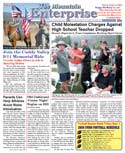Last week the office of the Kern County Coroner released the results of their inquiry into the death of Patrick Allen, 17. The Bakersfield Christian High School student died on August 16 after attending football practice in 104 degree heat two days earlier. Allen had cramps after practice and drank water to hydrate. He did not fall ill from heat stroke, but from “water intoxication,” or hyponatremia.
The Mountain Enterprise inquired how the Frazier Mountain High School coaching staff helps athletes avoid this threat.
“We are in constant communication by e-mail with the parents of our football players… giving them information about nutrition, hydration, injury prevention as well as information about scheduling and practices,” Coach Tim Garcia replied. Coach Tim Garcia forwarded an email note dated August 8 to parents and athletes (before Allen fell ill) about safeguards they must take to avoid this problem.
On August 6 Falcon parents received an email bulletin from the coaching staff:
The weather will be very warm and humid the next few days. Below is some information on keeping your son hydrated.
Proper hydration is helpful for achieving the best performance in athletes. Adequate fluid intake is also helpful for athletes to perform at their best.
The longer and more intensely you exercise, the more important it is to replace lost fluids. Hyponatremia, or water intoxication, is the result of drinking too much too quickly.
Now recommendations are going the other way, “Drink Less.” For many athletes water intoxication is a very real and very serious complication from drinking too much water.
Low blood sodium concentration may occur during longer events when athletes drink excessive amounts of plain water. Warning signs include nausea, muscle cramps, slurred speech, and confusion.
These are hydration guidelines: Remind your young athlete to drink no more than one cup of fluids every twenty minutes. They can also weigh themselves before and after practice to get a sense of how much fluid they typically lose. One pound is equivalent to approximately 24 ounces of fluid.
Sports drinks can be helpful to athletes who are exercising at a high intensity for 60-90 minutes or more. It’s necessary to replace losses of sodium, potassium and other electrolytes during exercise. We recommend that the athletes bring a sports drink to practice.
Freezing the contents before coming to practice will keep the fluid cool and will help in digestion and is absorbed faster by the body than fluids at room temperature or at body temperature. The American College of Sports Medicine recommends that water and other drinks be chilled when used for exercise.
We do supply water/Gatorade during practice but many times we run out. So that is why it is a good idea for the athlete to bring their own. Also, they can more easily regulate how much fluid they are ingesting.
Clearly, these guidelines are wise for athletes of all ages to follow.
This is part of the September 05, 2008 online edition of The Mountain Enterprise.
Have an opinion on this matter? We'd like to hear from you.


